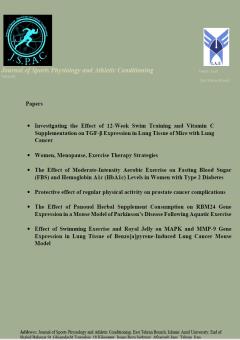-
-
-
Open Access Article
1 - Effect of beta-alanine supplementation on carnosine amount and muscle strength of the upper and lower extremities of bodybuilding athletes
Amir Abbasi Shahin Riyahi Malayeri Seyed Kazem Mousavi Sadati -
Open Access Article
2 - High intensity interval training and Eryngium billardieri extract consumption on MMP-2 gene expression of visceral fat in rats with metabolic syndrome
Mostafa Haji Gholami Shahin Riyahi Malayeri Asal ziloubaf Hedyeh Hassanpour -
Open Access Article
3 - Moderate aerobic exercise and probiotic intake on FOXA1 gene expression in non-alcoholic fatty liver animal model: An Experimental Study
Shahin Riyahi Malayeri Hamzeh MohamMadi Firooz Abad Omid Soleimani Ghaleh Soheila Azarkhosh -
Open Access Article
4 - Effect of 4 weeks of resistance training on Neural cell adhesion molecule gene expression of neuromuscular junction, gastrocnemius muscle in male rats
Mozhgan Hassan zadeh Mohammad Ali Azarbayjani Shahin Riyahi Malayeri Maghsoud Peeri Hassan Matin Homaee -
Open Access Article
5 - Aerobic exercise affects mitochondrial quality control
Faranak Amini Mohammad Ali Azarbayjani Shahin Riyahi Malayeri Lida Moradi
List of Articles Shahin Riyahi Malayeri
-
The rights to this website are owned by the Raimag Press Management System.
Copyright © 2017-2026


